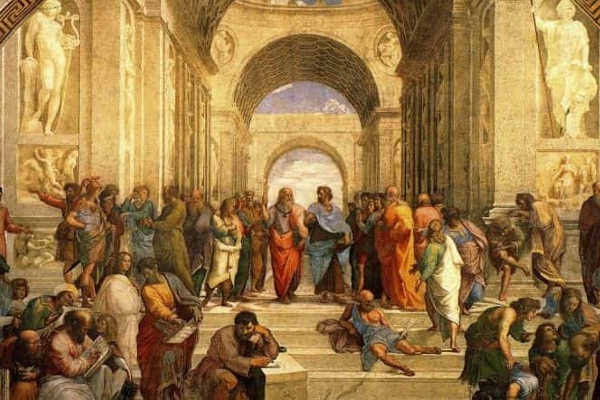
Passion of Truth
Passion, the word itself is derived from the Latin "passio", which derived from the Greek "pathos(πάθος)", means "suffering" or "experience". In a modern world with a modern society, suffering and struggling is minimized. Back in the day, people had wars, plagues even social distincts. Those were the things that made us suffer and struggle through life.
Yet, we are suffering more often today.
Our suffering, especially generational suffering is nothing against our descendants. Even a mere attempt to compare would be meaningless but that doesn't mean there is no relation.
Yes, they suffered less often but incredibly more intense.
Thus, they had to survive through. They had to feed themselves, their family. Most of the times, this lead to an oppression because of a survival instinct. They thought that as long as they fit in, everything would be fine. They chased a regular life.
Until 1440, when they started to see themselves in someone else’s shoes.
In Mainz, a city of Germany, a guy named Johannes Gutenberg modified his daily technology. He invented a movable, small, reusable metal letters arranged to form words. They were inked, pressed onto paper. He used a wine press mechanism. Thus he created consistent pressure, improved efficiency. Not only in writing but also in humanity, ideas were much easier to share. People had more access to every idea that led people to their desire.
Knowledge became democratized instead of nobility divised. The world turned upside down and opened unlimited blessings and curses for future.
Dante Alighieri, who wrote the Divine Comedy(Commedia), was exiled. Even before renaissance he had many radical political views. A great mind, intense and fiercely independent man. His thoughts were not only politically but also were philosophic yet emotionally driven. He was a defender of justice, whom hated corruption especially in the Catholic Church and Florentine politics. His exile was not stopping him, his later works were bitter, more critical. A great balance for dreamer and realist whom reshaped the literature forever.
The ruthless mind of Niccolo Machiavelli, a sharp-witted, political thinker. Who has been imprisoned and tortured for a "suspected" conspiracy against the Medici. By himself was a sarcastic and even playful man whom enjoyed tavern jokes and satire. Yet, he believed in realpolitik, seeing power as something to be wielded effectively. Not morally. Unlike the idealists he was concerned about practical results over ethical problems. Which led him to create one of the greatest masterpieces about strategy in literature "The Prince". Even though all of this, he was not purely cynical; he admired republicanism and despised corruption, longed for a strong, unified Italy. He understood power better than most but was never truly allowed to wield it by himself.
The lesser known, brilliant and defiant man who pursued the truth regardless of the consequences. A physician, theologian and scientist even a challenger against both Catholic and Protestant doctrines, rejecting trinity and defending more rational approach to faith. The first European to correctly describe the "pulmonary circulation" yet, the discoveries of Michael Servetus were overshadowed. Thanks to the religious controversies. His pursuit of passion and refusal of make-belief truths made him many enemies. Especially John Calvin, who had him burned at the stake. Yet, his ideas lived much longer than John Calvin. Represented a fearless thinker, a symbol of intellectual defiant.
So as the bold, visionary and rebellious Giordano Bruno! A philosopher, scientist and former Dominican friar, once again a challenger for church and the defender of his passion. He defended an infinite universe with countless worlds in 1600s against the church. He was deeply influenced by hermeticism, memory systems and radical metaphysics, blending the science with mysticism. With a sharp tongue refusing to submit, made him a target, even further mocked the dogma and interpreted the religious authorities as intellectually stagnant. After many years of wandering he got arrested and just like Servetus he got burned at the stake in 1600s. A fearless intellectual who valued the truth over survival, a great tragic figure in the defense of free thought.
A deeply troubled man, whose genius was matched only by his volatility, an intense, passionate artist. Breaking away from traditional, idealized depictions of religious figures and chasing for realistic, raw and often gritty portrayals by depicting saints and sinners. A usage of chiaroscuro that has never seen before and revolutionizing the art, giving his work an dramatic intensity. Yet he was not as pure as the others. His life was marked by violence and instability. His notorious temper made him get involved in multiple brawls and even a felon of murder. Despite his troubled nature, his passion and vision in art, his deep emotional complexity blending with realism and the influence on the Baroque art remains profound.
Many of these man were not only confronted, they were threatened, censored, exiled, hated and some of them even got burned at the stake. Suffered, more than most of us, yet gone after their passion of truth no matter what and showed, changed, reshaped the world with their mind.
The reason their ideas longed more than the hate, suffering, benevolence and even themselves are because of;
Their profound passion of truth.
Yorumlar
